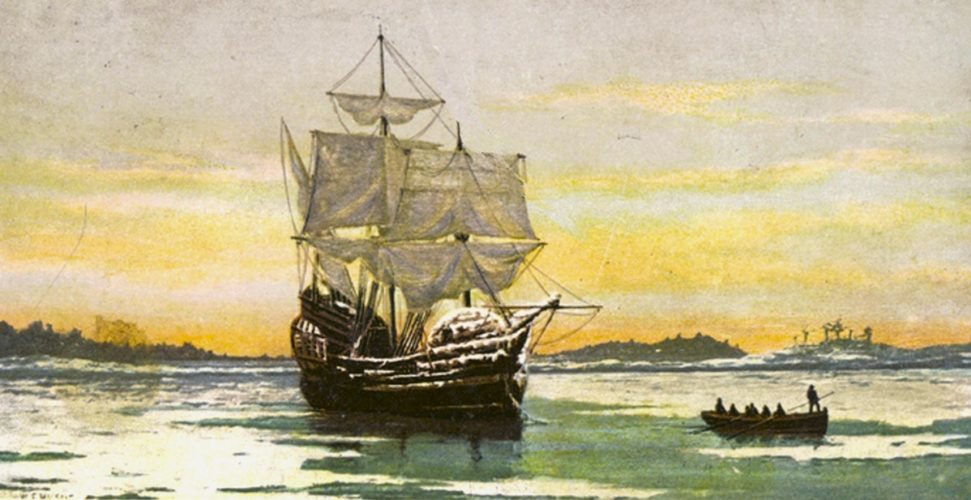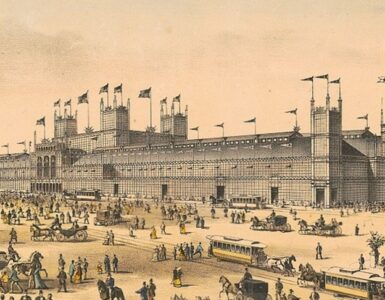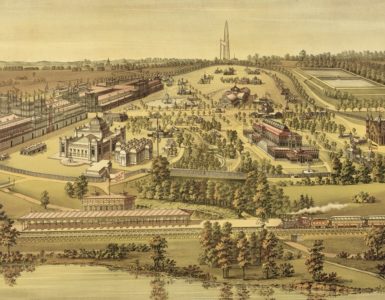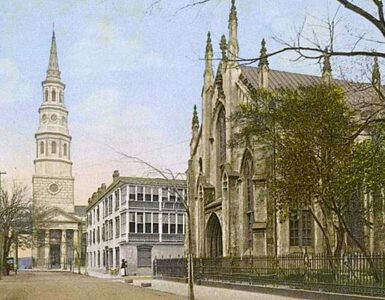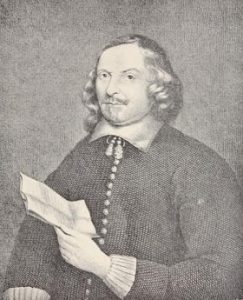
The letter that follows this introduction was sent by Edward Winslow from Plymouth Plantation to George Morton in December 1621 as part of what came to be published by Morton with other material as A Relation or Journal of the Beginning and Proceedings of the English Plantation Settled at Plimoth in New England, 1622, henceforth abbreviated A Relation. The book is specifically identified as having been published by “G. Mourt” at the end of its “To the Reader” section, thus the true identity of Mr. Mourt has been debated given the difference in spelling between Morton and Mourt. The issues involved in Mourt’s identification are addressed by H. M. Dexter in the edition of A Relation he edited for publication in 1865. The ship carrying Winslow’s work to England was the Fortune which had recently arrived in Plymouth. The letter and other material in A Relation were likely taken to England by Robert Cushman and given to George Morton. It is a wonder that A Relation made it to England because the Fortune was seized by the French as it neared the English coast and robbed of anything valuable, but it was later released after a short time of capture. One particularly valuable and bulky part of the cargo was clapboards hewn from the rich forests of America and there were some casks filled with pricey beaver and other pelts.
Edward Winslow was born in 1595. He married Elizabeth Barker and at the time of their arrival in Plymouth they were guardians for a little girl named Ellen who was the sister of Richard More. The family also had two male servants named George Soule and Elias Story. Winslow was educated in an Anglican school. He was a printing apprentice, however, he did not complete his training before leaving England for Holland to reside with other separatists. He worked in printing in Leyden with fellow separatist William Brewster until they boarded the Mayflower for Plymouth. Elizabeth Winslow died shortly after arrival in Plymouth. Edward then married Susanna White who was a widow and the mother of the first child born in the colony, Peregrine White. Winslow was a governor of Plymouth Colony and highly influential for the success of the community. He died aboard ship near Jamaica in 1655.
George Morton would arrive in Plymouth in July 1623 aboard the Anne with his wife Juliana Carpenter Morton and their five children—Nathaniel, Patience, John, Sarah, and Ephraim. Morton received seven acres in the land division of Plymouth in 1623. But the difficulties of New England life quickly took its toll on Mr. Morton as it did so many other colonists because he died in June 1624.
The letter provides an interesting overview of life for the first year of Plymouth Plantation. Most importantly for this article there is a paragraph about the first Thanksgiving, but do not look for the word because it is not in the letter.
 As compared with other early seventeenth-century authors, Edward Winslow is not one of the better writers. The following text has been modernized and the more cumbersome lengthy sentences have been broken into shorter statements. Also, the paragraphing has been modified. In one location an ellipsis, three periods in a row, will be found in the place of about four lines of text which I could not understand sufficiently to compose in a coherent form. There are many ambiguities in Winslow’s text at least partially due to his composing it for a friend whom he assumes knows certain facts, issues, and events which are mysteries to modern readers. In several locations I have turned to paraphrasing and completely rewriting sentences for the sake of clarity. Some archaic terminology has been explained in [ ].
As compared with other early seventeenth-century authors, Edward Winslow is not one of the better writers. The following text has been modernized and the more cumbersome lengthy sentences have been broken into shorter statements. Also, the paragraphing has been modified. In one location an ellipsis, three periods in a row, will be found in the place of about four lines of text which I could not understand sufficiently to compose in a coherent form. There are many ambiguities in Winslow’s text at least partially due to his composing it for a friend whom he assumes knows certain facts, issues, and events which are mysteries to modern readers. In several locations I have turned to paraphrasing and completely rewriting sentences for the sake of clarity. Some archaic terminology has been explained in [ ].
Sources for this introduction include the Plimoth Plantation website and William Bradford’s journal as cited in last years article on Thanksgiving. The edition of A Relation edited by Dexter was located in PDF on Internet Archive; Winslow’s letter is on pages 192-203 of the PDF, which are pages with the dual numbering of 60 & 131 through 142 & 65 of the original book as scanned to PDF (when you see the PDF you should understand what I mean). Note that there have been several editions of A Relation over the years including abridged versions which Dexter mentions in the introduction to his edition, and he has observed that some editions are not very well done. Dexter includes in his extensive footnotes a list of the passengers who arrived in Plymouth on the Fortune.
The original Plimoth (Plymouth) Plantation is a living museum which can be visited to experience the world of Winslow and the colonists. The village provides a wonderful experience through its buildings, grounds, and interpreters. At a separate location near Plymouth Rock there is a replica of the Mayflower which may lead visitors to revise their understanding of how large a vessel needs to be before it can be called a ship.
The header is a postcard image of the Mayflower in Plymouth harbor from the New York Public Library digital collection, The Miriam and Ira D. Wallach Division of Art, Prints and Photographs: Photography Collection. The images of Edward Winslow and the title page were located in The Story of The Pilgrim Fathers 1606-1623 as told by Themselves, their Friends, and their Enemies, which was written by Edward Arber, published in London in 1897, and found in digital form on Internet Archive.
Barry Waugh
Loving and old Friend, although I received no letter from you by this ship [Fortune], yet forasmuch as I know, you expect the performance of my promise which was to write unto you truly and faithfully of all things. I have therefore at this time sent unto you accordingly referring you for further satisfaction to our more large relations [the rest of A Relation]. You shall understand that in the short time we few have been here, we have built seven dwelling houses, four buildings for the use of the plantation, and have made preparation for several others. We sowed last spring some twenty acres of Indian corn and some six acres of barley and peas. According to the manner of the Indians, we fertilized our ground with herrings, or rather shads, which we have in great abundance and catch with great ease near our homes. Our corn did prove well, and God be praised, we had a good increase of Indian corn and our barley was fairly good, but our peas were not worth gathering. We feared that they were sown too late. They came up very well, and blossomed, but the sun parched them in the blossom.
[Paragraph regarding the first Thanksgiving] Our harvest being collected our governor sent four men fowling together so we might rejoice together in a more special way after we had gathered the fruit of our labors. In just one day the hunters killed as much fowl as if their hunting party had been larger. The fowl fed the company almost a week at which time, among other recreations, we drilled with our fire arms. Many of the Indians joined us including Massasoit, the greatest king, and some ninety of his men. We all entertained and feasted together for three days. The Indians went out and killed five deer which they brought to the plantation and bestowed on our governor, the captain, and others. And although it is not always as plentiful as it was at that time, yet by the goodness of God we are so far from want that we often wish you could partake of our plenty.
We have found the Indians very faithful in their covenant of peace with us and very loving and ready to please us. We often visit them, and they come to us. Some of us have explored fifty miles into the land with them. The occasions and relations of them you shall understand by our general and more full declaration of such things as are worth noting [in A Relation]. Yea, it has pleased God to instill in the Indians a fear of us and love unto us so that not only their greatest king, Massasoit, but also all the princes and peoples round about us have visited us.…There is now great peace among the Indians themselves which was not the case formerly, neither would have been but for us, and we for our part walk as peaceably and safely in the wood as on the highways in England. We entertain the Indians familiarly in our houses and they are friendly to us bestowing their venison as gifts. They are a people without any religion or knowledge of any God, yet they are very trustworthy, quick of apprehension, and ripe witted. The Indian men and women go naked except for a skin about their middles. The temperature of the air here agrees well with that in England and if there be any difference at all, here it is somewhat hotter in summer and some think it to be colder in winter, but I cannot out of experience so say. The air is very clear and not foggy, as has been reported.
I never in my life remember a more seasonable year than we have here enjoyed [he must be excluding the previous winter], and if we had cows, horses, and sheep, I make no question but that men might live as contented here as in any part of the world. For fish and fowl, we have great abundance, fresh cod in the summer is but mean meat for us, our bay is full of lobster all summer and affords a variety of other fish. In September we can catch a hogshead [a barrel holding just over 60 gallons] of eels in a night with little trouble digging them out of their beds. All winter we have mussels and clams available, and we have no oysters near by, but we can have them brought by the Indians when we want. All the spring time the earth brings forth very good salad herbs, and there are grapes, white and red, which are very sweet and strong also. There are also strawberries, gooseberries, raspberries, etc., and plums of three sorts, white, black, and red, which are almost as good as a damsen [a variety of plum]. Also, there is an abundance of roses, white, red, and damask, which have single blooms and are very sweet indeed. The country needs only industrious men to work. It would grieve your heart, if as I, you had seen so many miles of land along goodly rivers uninhabited, which could be used by some people in your part of the world which is so burdened with an abundance of people. I thought these things would be good for you to understand being the truth of things as near as I could experimentally know and that you might on our behalf thank God who has dealt so favorably with us.
Our supply of men from you came the ninth of November 1621 putting in at Cape Cod, which is some eight or ten leagues [24 to 30 miles] from us. The Indians that dwell thereabout were the owners of the corn we found in caves, for which we have given them full payment and we are in a great league with them. They sent us word there was a ship near them, but they thought it to be a French man [of war], and indeed for ourselves, we did not expect a friendly ship so soon. So, when we perceived that she made for our bay, the governor commanded a great powder weapon to be shot off to call home those who were dispersed at work. Every man, yea, boy that could handle a gun was ready, with full resolution, that if there were an enemy we would stand in just defense, not fearing them. However, God’s purpose for us was better than we supposed because the ship was the Fortune. All its passengers came to us healthy with none being sick from the journey (otherwise than by sea sickness) and so they continue healthy at this time by the blessing of God. The good-wife Ford bore a son the first night she landed and both of them are very well.
When it pleases God, we are settled and fitted for the fishing business and other trading. I doubt not but that by the blessing of God the gain will give satisfaction to all. In the mean time, what we have received we had sent to us and though it is not much, yet it will show to us that we have not been idle considering the smallness of our number all this summer. We hope the merchants will accept our shipment to them and be encouraged to furnish us with things needful for further employment, which will also encourage us to put forth ourselves to the uttermost.
Now, because I expect your coming to us with some of our friends whose company we much desire, I thought it would be good to advise you of a few things needful for life here. Be careful to have a very good bread-room on the ship to store your biscuits. Your casks for beer and water should be ironbound for the first hoop if not more. Meat should be dry salted, no one can do that task better than the sailors. Flour should be so hardly packed in your cask that you shall need an adz or hatchet to dig it out. Do not count on us having much corn at this time because the last company that visited depended wholly on us, so we shall have little enough to harvest. Be careful to have access to some of your flour during your voyage, it will much refresh you. Build your cabins on the ship as open as you can and bring a good amount of clothes and bedding with you. Every man should bring a musket or fowling piece, which should have a long barrel. The weight of the firearm will not be a problem because most of our shooting is from stands. Bring some lemon juice and take it while fasting, it is of good use [prevents scurvy]. For [medicinal] hot waters, anise-seed water is the best, but use it sparingly. If you bring anything for comfort [luxury?] in the country, butter or salad oil, or both is very good. Our Indian corn, even the coarsest, makes as pleasant food as rice, therefore do not bring rice unless it is to be used along your journey. Bring paper and linseed oil to make your windows and bring cotton wicks for your lamps. Your shot should be mostly for large fowl and bring a supply of it along with powder.
I forbear to write further for the present, hoping to see you by the next return, so I take my leave commending you to the Lord for a safe journey to us.


